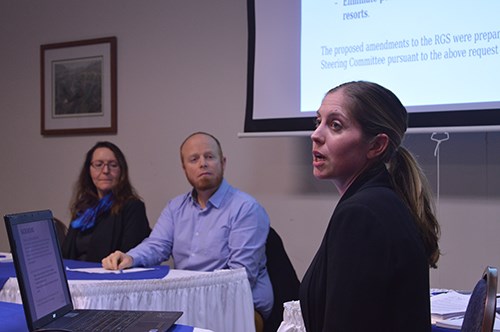Proponents for the proposed Garibaldi at Squamish ski resort made their voices loud and clear during Monday’s public hearing on a motion that many perceived as a snipe against the project.
There was standing room only for the dozens gathered to give their opinions on a resolution put forth by the Squamish-Lillooet Regional District that would eliminate destination resort language from its Regional Growth Strategy.
The Regional Growth Strategy, or RGS, is a high-level document that outlines how future growth and development should take place in the SLRD.
Several key themes were expressed among the majority who supported Garibaldi at Squamish, or GAS, in a conference room at the Sea to Sky Hotel on Feb. 19.
Many believed removing destination resort language in the Regional Growth Strategy would stifle the proposed project unfairly.
Some described it as “moving the goalposts,” while others said it was wrongly changing the rules or criterion for the resort when the company was still in the middle of the application process.
Some described the economic benefits the project would presumably have on Squamish, while others said that it was in Whistler’s interest to stifle competition from a Squamish resort.
It was pointed out by an audience member at least once that a Whistler politician was chairing the SLRD.
“There is a glaring irony in a proud Whistler councillor with self-described deep roots in the Whistler community presiding over a public hearing where we are discussing a potential ski resort project in Squamish,” said Adrien Byrne.
Byrne added that such an arrangement was “in the interests of Vail Resorts.”
“Regionally, we are as a town hemorrhaging tourist money to another community,” said Dwayne Kress, referring to Squamish’s relationship to Whistler. Kress organizes the Sp’akw’us 50 bike race.
A great many of those who spoke were very critical of what they considered to be the regional district’s lack of communication with the public on the matter.
The SLRD had held a public hearing on the amendment months before the Feb. 19 public hearing, bringing the number of public hearings on this matter to two — something of an anomaly, as it is often standard procedure to have only a single formal public hearing.
However, many still believed that public input was sorely lacking in this proposal and berated the SLRD for taking the amendment this far in the process.
“On the surface, the way it was presented to the public was in no simple terms an abomination of due process,” said Jeff Levine, a Brackendale resident known for his work at the Sea to Sky Adventure Company. “A single public notice in a Whistler newspaper over the Labour Day long weekend and a single public consultation period in Pemberton.”
Among those in support of GAS — and therefore critical of the proposed amendment — were some members of the business community, District of Squamish Coun. Ted Prior, representatives of GAS and the Squamish Nation.
“Our people need to work,” said Chief Dale Harry of the Nation. “Everybody needs to feed their family.”
“If you can have business, First Nations [and] environment working together, then you’ve got yourself a project,” he said. “Then you’ll have the Squamish Nation support.”
Harry also read from a letter the Nation previously submitted to the SLRD that expressed disagreement with the motion to remove destination resort language from the RGS.
There were some who were against GAS — and therefore in favour of the proposed amendment — but they didn’t dominate the conversation in the same way that GAS proponents did.
Their comments were generally much more short.
They brought forth concerns of overcrowding, excessive traffic, loss of greenspace, worries that resort snow wouldn’t be consistent, drainage to a local aquifer and heightened housing prices.
Thor Froslev, owner of the Brackendale Art Gallery, stood up and declared GAS “a real estate coup.”
Brenda Bjorkman said that she filled a petition with 203 signatures from Paradise Valley residents who oppose the GAS project over fears it would drain a local aquifer.
“I’d love another ski resort, but do it without our water,” said Bjorkman. “We don’t need to have another resort.”
GAS representatives later said the resort is considering drawing water elsewhere, but Bjorkman told The Chief she finds it hard to believe any other source could meet the demand for a project of that scale.
SLRD chair Jack Crompton said the regional district believed removing the destination resort language would actually make the document more clear.
He said it would remove the potential impression that there is currently land zoned for destination resorts, when there is no such land in the regional district.
Crompton added the current text regarding resort destinations is merely “descriptive language” and not at all a framework or criterion for laying out how such a project would be incorporated in the SLRD.
This would imply that it wouldn’t have any effect on a project like GAS.
However, most of those gathered at the meeting didn’t appear to agree with this interpretation, and the hearing was focused almost exclusively on the fate of GAS.



